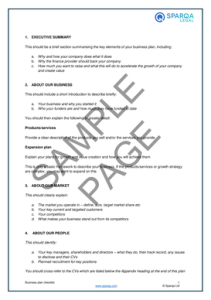 If you are looking to successfully raise funds for your business, a well written and comprehensive business plan is essential. By using our free business plan template UK checklist, you can create a persuasive document that quickly stands out to an investor or lender.
If you are looking to successfully raise funds for your business, a well written and comprehensive business plan is essential. By using our free business plan template UK checklist, you can create a persuasive document that quickly stands out to an investor or lender.
Our checklist includes guidance on how to structure your business plan and how to provide details about your existing business model, staff and other people associated with your business, your market and industry, financial information and your future strategy and plans, and what financing you require.
You should also consider whether you need to ask any recipients of your business plan to sign an NDA, to protect your business plan from being copied or stolen.
Contents
Business plan template UK: Creating your plan
Why do I need a business plan template UK?
Most share investors and lenders will not be prepared to fund your business unless they see a well thought out, well presented and persuasive business plan. They will probably decide on the basis of your plan whether or not to enter into serious discussions with you on funding. You will therefore need a plan which conveys what your business is about, who are the key managers and shareholders, and why an investor or lender should fund your business.
Your plan should be ready before you start discussions with potential funders. If you already have a plan, read it again, consider the basis on which it was originally drawn up and think carefully about what changes should be made.
You will be able to use your finalised business plan to produce the following for meetings and discussions with share investors and lenders:
-
- a one page teaser which you can send to a particular investor or lender as your first written communication;
- a management presentation or pitch deck, often in the form of PowerPoint slides, which you use to present on the business in a meeting with an investor or lender; and
- if you plan to issue shares, an information memorandum which you and your advisers could circulate to a number of interested parties.
Where can I find a free business plan template UK checklist?
Sparqa Legal has a free Business plan checklist that you can use to put a business plan together (for example, if you need to raise funding for your company). It guides you through the key areas you need to cover in your plan to present a strong case to potential funders.
How do I use the business plan template UK checklist?
- Follow the button above or click on this link;
- Download the checklist;
- Use the tips included in the checklist (and the guidance below) to create your bespoke business plan;
- Consider whether you need to ask any recipients of your business plan to sign an NDA before you share your business plan.
Note that if you already have a business plan, the checklist can still help you to ensure that you have covered the right areas and/or to refresh your plan to ensure it is up to date.
What is included in the business plan template UK checklist?
The Business plan checklist covers everything you need to create a convincing business plan. It sets out an appropriate structure for your plan and includes guidance on the main areas to cover, including:
- your current business model;
- market and industry research;
- your staff and other stakeholders;
- financial information; and
- your future strategy and what funds you want to raise.
The checklist also includes guidance on additional matters you need to cover if you are looking for share investors, and/or are planning to apply for tax reliefs under SEIS or EIS.
Business plan template UK: Making your plan stand out
What do I need to consider when creating my business plan?
1. Make your business plan stand out
You should regard the Business plan checklist as a starting point. What needs to come across in your plan is what makes your business and your team stand out. You should keep asking yourself ‘why my business?’, ‘why should an investor or lender back my team?’, ‘why should an investor or lender fund my business?’ and check that the plan answers your questions.
2. Length of your plan
You need to make sure that your key points come across in the plan and that these are not lost in the detail. Think about the length of your plan and assume that an investor or lender will have limited time to review it.
3. An executive summary
You should write the executive summary at the beginning once you have finished and are happy with the rest of your plan. Bear in mind that this is what will be read first so make sure the summary conveys the key messages you want to come across.
4. Financial advice
Think about whether an accountant or financial adviser could be helpful to you in compiling and presenting the key financial information you will need to include in your plan, such as profit and cash flow forecasts. See Instructing advisers for how to go about instructing advisers.
5. Protecting confidential information
Think about protecting confidential or sensitive information by holding it back from the business plan which you initially present and only disclosing this when you are further down the line with a particular investor or lender. See Protecting confidential information and NDAs for guidance on putting in place an NDA, and the pros and cons of doing so, before disclosing confidential or sensitive information to a potential funder.
6. Your team
When including details about your team, as well as successes you should at the appropriate time mention previous issues (such as a regulatory investigation or financial difficulty) to show you are being completely open. You should assume these will be revealed by an investor’s due diligence.
7. Warranting your plan
A share investor will typically ask your company and management shareholders to warrant that your business plan has been reasonably put together and is factually true and accurate, and then require you to update it on a regular basis. See Agreeing terms for a new share investment for information about warranties generally.
8. Tax reliefs for share investors
If you are planning to issue shares under either the SEIS or EIS tax relief schemes, HMRC will expect to see a developed business plan before confirming that tax reliefs will be available to share investors.
Sharing your business plan template UK: How to protect yourself
What should I do before disclosing my business plan?
Before disclosing a business plan to any potential finance provider, you should:
- consider whether you should ask the finance provider to sign a non-disclosure agreement (see Financing non-disclosure agreement for a template non-disclosure agreement); and
- if you are raising money by issuing new shares, comply with the restrictions on communicating with potential share investors.
How do I put in place a non-disclosure agreement (NDA)?
It is inevitable that you will need to disclose information about your business to outsiders in the course of a fund-raising process. It is also inevitable that some of this information will be confidential or sensitive.
One of the most common ways of seeking to protect business information is to ask receiving parties to sign an NDA before disclosing anything to them.
See Financing non-disclosure agreement for a template NDA which you can adapt for signature by someone to whom you propose to disclose information. This template NDA, which has been drafted to present a balanced document and minimise negotiation:
- assumes no information has been disclosed to the funder prior to signing;
- lasts for two years as most finance providers who sign an NDA will expect it to be limited in time. You should choose a longer period if there are good reasons in relation to the information you are seeking to protect;
- does not include prohibitions on approaching or dealing with customers or suppliers, or approaching or employing staff, which can prove contentious with some types of investor. If you have concerns here you should obtain legal advice on how best to protect yourself. For access to a specialist lawyer in a few simple steps, you can use our Ask a Lawyer service.
If you request an NDA, you should make sure you have a good explanation as to why you need one, and you should ask for it to be signed before you disclose any information to the funder (otherwise there may be an issue with enforcing the NDA).
Preparing for fund-raising: Time management
How long will I and other management need to spend on the fund-raising and how do we find the time?
Raising finance is time-consuming and you should not underestimate the amount of management time that will be required. Time spent on raising finance will be in addition to your and other managers’ day jobs of running the business, and can therefore lead to a very heavy workload. You should all therefore be prepared to commit significant time, over and above your usual commitments, if you are looking to raise finance for your business and achieve the best possible outcome.
When raising finance, you and your other managers will need to find time to:
- take steps to protect your business and obtain necessary approvals before approaching share investors or lenders;
- instruct appropriate advisers;
- prepare a business plan and information on your business;
- find an appropriate share investor (see Choosing and approaching new share investors) or lender (see Choosing a lender);
- prepare and make management presentations to potential investors and lenders;
- respond to due diligence requests and put together disclosures against any warranties (see Agreeing terms for a new share investment);
- negotiate and agree investment agreements if you are raising money by issuing shares (see Agreeing terms for a new share investment); and
- negotiate and agree loan agreements if you are raising money by borrowing (see Agreeing terms for a loan).
You will want to limit those in your business involved in the process to help protect confidentiality and avoid information leaking. However, to ease the burden on you and other managers personally during this period, you should consider:
- delegating where you can;
- focusing only on day to day business operations where it is essential for you to be involved, so that you can give time to the fund-raising; and
- instructing advisers to assist you.
For further guidance on how to prepare for raising money, see Preparing a business to raise money.

Marion joined Sparqa Legal as a Senior Legal Editor in 2018. She previously worked as a corporate/commercial lawyer for five years at one of New Zealand’s leading law firms, Kensington Swan (now Dentons Kensington Swan), and as an in-house legal consultant for a UK tech company. Marion regularly writes for Sparqa’s blog, contributing across its commercial, IP and health and safety law content.






